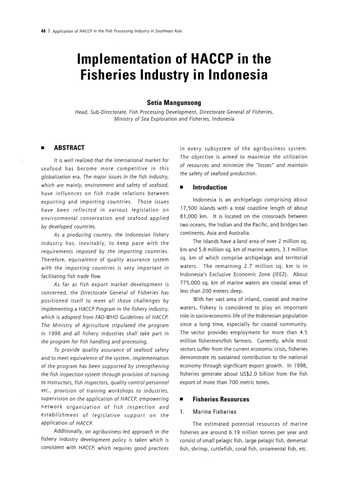| dc.contributor.author | Mangunsong, Setia | |
| dc.contributor.editor | Yeap, Soon Eong | |
| dc.contributor.editor | Kok, Tiong Ngei | |
| dc.date.accessioned | 2019-02-21T09:40:27Z | |
| dc.date.available | 2019-02-21T09:40:27Z | |
| dc.date.issued | 2001 | |
| dc.identifier.citation | Mangunsong, S. (2001). Implementation of HACCP in the fisheries industry in Indonesia. In S. E. Yeap & T. N. Kok (Eds.), Proceedings of the 1st Regional Workshop on the Application of HACCP in the Fish Processing Industry in Southeast Asia, 28 August-1 September 2000, Singapore (pp. 44-51). Singapore: Marine Fisheries Research Department, Southeast Asian Fisheries Development Center. | en |
| dc.identifier.isbn | 9810435975 | |
| dc.identifier.uri | http://hdl.handle.net/20.500.12066/4484 | |
| dc.description.abstract | It is well realized that the international market for seafood has become more competitive in this globalization era. The major issues in the fish industry, which are mainly, environment and safety of seafood, have influences on fish trade relations between exporting and importing countries. Those issues have been reflected in various legislation on environmental conservation and seafood applied by developed countries.
As a producing country, the Indonesian fishery industry has, inevitably, to keep pace with the requirements imposed by the importing countries. Therefore, equivalence of quality assurance system with the importing countries is very important in facilitating fish trade flow.
As far as fish export market development is concerned, the Directorate General of Fisheries has positioned itself to meet all those challenges by implementing a HACCP Program in the fishery industry, which is adopted from FAO-WHO Guidelines of HACCP. The Ministry of Agriculture stipulated the program in 1998 and all fishery industries shall take part in the program for fish handling and processing.
To provide quality assurance of seafood safety and to meet equivalence of the system, implementation of the program has been supported by strengthening the fish inspection system through provision of training to instructors, fish inspectors, quality control personnel etc., provision of training workshops to industries, supervision on the application of HACCP, empowering network organization of fish inspection and establishment of legislative support on the application of HACCP.
Additionally, on agribusiness-led approach in the fishery industry development policy is taken which is consistent with HACCP, which requires good practices in every subsystem of the agribusiness system. The objective is aimed to maximize the utilization of resources and minimize the "losses" and maintain the safety of seafood production. | en |
| dc.language.iso | en | en |
| dc.publisher | Marine Fisheries Research Department, Southeast Asian Fisheries Development Center | en |
| dc.subject | Indonesia | en |
| dc.title | Implementation of HACCP in the fisheries industry in Indonesia | en |
| dc.type | Conference paper | en |
| dc.citation.spage | 44 | |
| dc.citation.epage | 51 | |
| dc.citation.conferenceTitle | Proceedings of the 1st Regional Workshop on the Application of HACCP in the Fish Processing Industry in Southeast Asia, 28 August-1 September 2000, Singapore | en |

